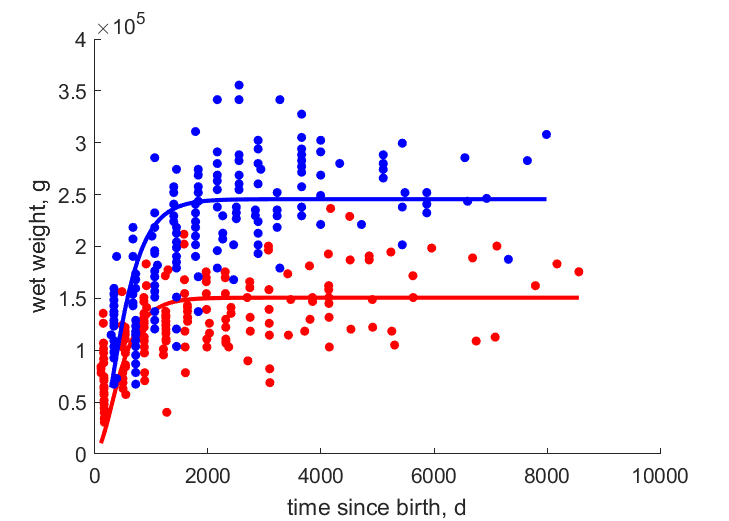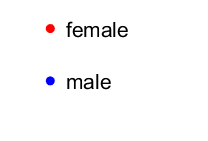Predictions & Data for this entry
| Model: stx | climate: BSk, BWk, Dfb, Dfc | migrate: TT | phylum: |
| COMPLETE = 2.5 | ecozone: TH | food: bxM, xiO | class: |
| MRE = 0.152 | habitat: 0iTf, 0iTh | gender: Dg | order: |
| SMSE = 0.048 | embryo: Tv | reprod: O | family: |
Zero-variate data
| Data | Observed | Predicted | (RE) | Unit | Description | Reference |
|---|---|---|---|---|---|---|
| tg | 103 | 100.2 | (0.02743) | d | gestation time | AnAge |
| tx | 213 | 202.2 | (0.05052) | d | time since birth at weaning | AnAge |
| tp | 1313 | 1626 | (0.238) | d | time since birth at puberty | AnAge |
| am | 1.46e+04 | 1.457e+04 | (0.002133) | d | life span | AnAge |
| Li | 200 | 213.1 | (0.06572) | cm | ultimate head-body length for female | Wiki |
| Lim | 260 | 244.1 | (0.06102) | cm | ultimate head-body length for male | Wiki |
| Wwb | 510 | 580.9 | (0.139) | g | wet weight at birth | AnAge |
| Wwx | 2.6e+04 | 2.702e+04 | (0.03924) | g | wet weight at weaning | AnAge |
| Wwi | 2.775e+05 | 1.506e+05 | (0.4573) | g | ultimate wet weight | AnAge |
| Ri | 0.002347 | 0.002612 | (0.1129) | #/d | maximum reprod rate | AnAge |
Uni- and bivariate data
| Data | Figure | Independent variable | Dependent variable | (RE) | Reference |
|---|---|---|---|---|---|
| tW_f |   | time since birth | wet weight | (0.2672) | SwenAdam2007 |
| tW_m |   | time since birth | wet weight | (0.1948) | SwenAdam2007 |
Pseudo-data at Tref = 20°C
| Data | Generalised animal | Ursus arctos | Unit | Description |
|---|---|---|---|---|
| v | 0.02 | 0.1572 | cm/d | energy conductance |
| p_M | 18 | 36.07 | J/d.cm^3 | vol-spec som maint |
| k_J | 0.002 | 0.002 | 1/d | maturity maint rate coefficient |
| k | 0.3 | 0.4313 | - | maintenance ratio |
| kap | 0.8 | 0.9264 | - | allocation fraction to soma |
| kap_G | 0.8 | 0.8068 | - | growth efficiency |
| kap_R | 0.95 | 0.95 | - | reproduction efficiency |
| t_0 | 0 | 74.26 | d | time at start development |
Discussion
- Males are assumed to differ from females by {p_Am} only
- mod_1: males have equal state variables at b, compared to females
Facts
- northern pop are heavier in autumn, but lighter in spring than southern and hybernate for a longer time. Am pop are heavier because salmon eating (Ref: SwenAdam2007)
Bibliography